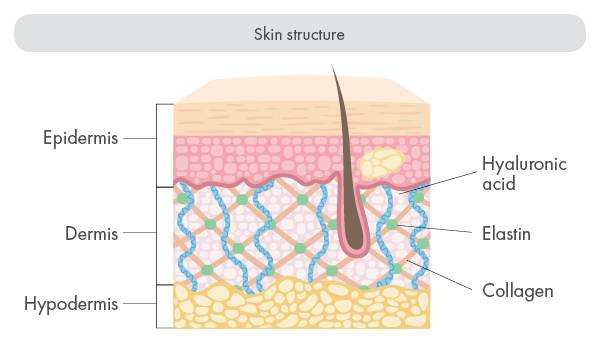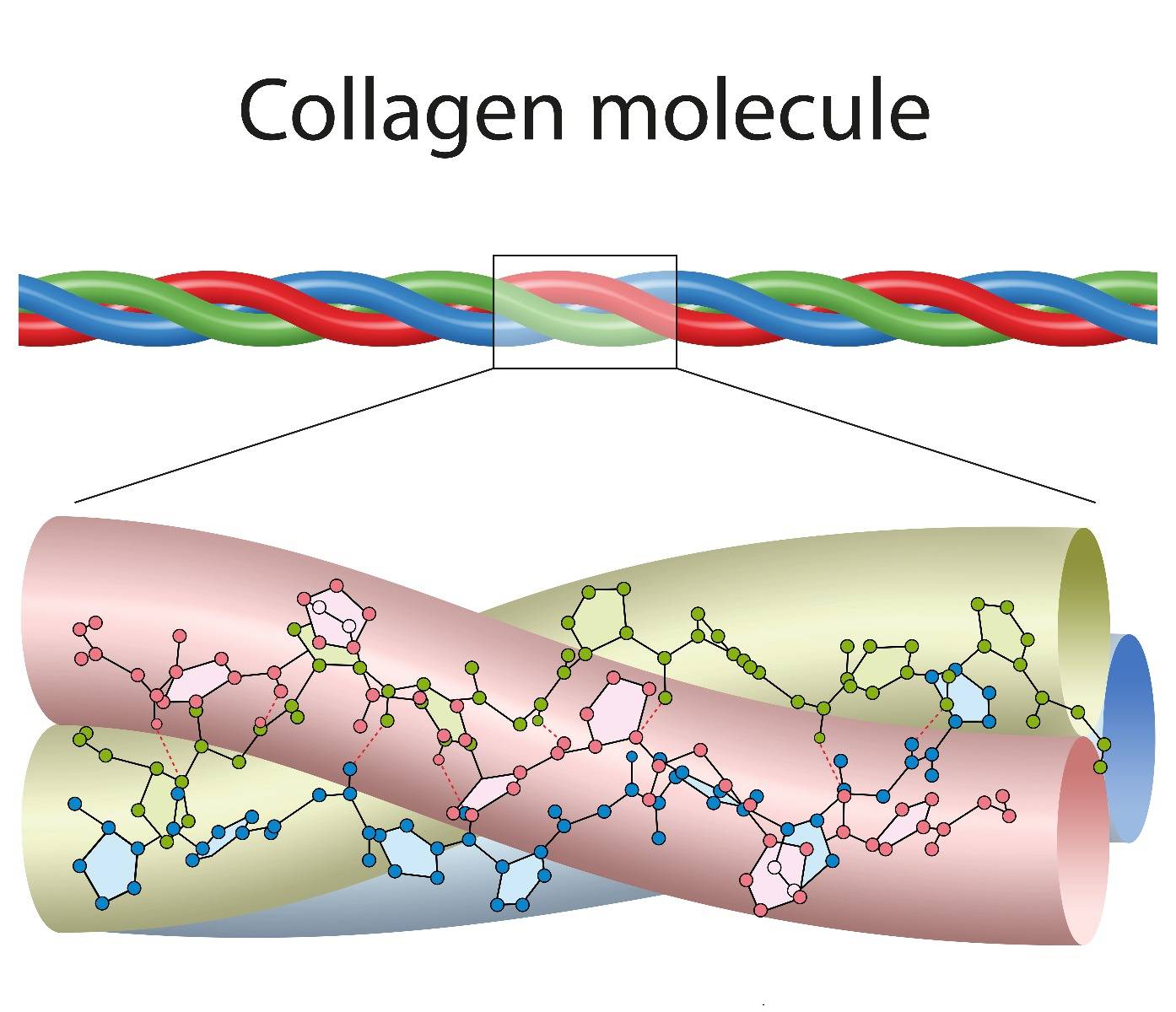
Collagen: Beauty doesn't wait ! Neither does your skin !
Beauty / Skin / Hair
Over the years, the cells responsible for the production of type I collagen diminish, leading to a decrease in collagen production. As a result, the collagen networks fragment, causing the appearance of wrinkles and a reduction in the skin's firmness. To remedy this phenomenon, the THERASCIENCE Laboratory has developed DERMASSENTIEL Collagène skin et DERMASSENTIEL Collagène +, collagen-based food supplements to preserve the density and firmness of the skin.
Allowing the body to regulate its temperature and produce vitamin D, the skin's main role is to act as a barrier against external pollution, micro-organisms and UV radiation. With a surface area of 1.5 to 2 square metres and a weight of 3 to 5 kg, the skin covers the entire body and is the largest and heaviest organ in the human body. The skin is structured in three distinct layers :
- The epidermis
The top layer of the skin, the epidermis, is 0.1 millimetres thick. This first layer is made up of very specific cells: the keratinocytes, which produce keratin. The epidermis plays a role in the impermeability of the skin. It also forms a physical barrier against external aggressions such as infections and UV rays.
- The dermis
Located under the epidermis and above the hypodermis, the dermis contains nerve fibres for sensing pressure, pain and temperature. In addition, this layer contains blood vessels that supply the epidermis. The dermis is made up of fibroblasts, cells involved in the production of type I collagen, which gives the skin its strength, and elastin, which allows the dermis to be stretchy and flexible. Fibroblasts are also involved in the healing of the skin. Finally, the dermis contains hyaluronic acid which contributes to the elasticity and hydration of the skin.
- The hypodermis
The deepest layer of the skin, the hypodermis is made up of fat cells that protect against the cold and serve as an energy reserve.

Type I collagen : a structural protein of the skin
Type I collagen is the most abundant type of collagen in the body and is one of the 28 types of collagen identified to date. Synthesised by fibroblasts, type I collagen is notably present in the skin, more particularly in the dermis, and gives it its elasticity and firmness properties.

Collagen is a protein made up of three chains of amino acids, the main ones being glycine, proline and hydroxyproline. Numerous reactions are necessary to achieve the final form of collagen in a triple helix. One of these reactions is the hydroxylation of proline with vitamin C. This hydroxylation reaction of the amino acids present in collagen gives this protein stability.
The importance of vitamin C in the production of collagen is well known. Indeed, until the 19th century, during long crossings, sailors often lacked fruit and vegetables, sources of vitamin C. They then developed scurvy. They then developed scurvy, a disease linked to a defect in the production of collagen that could lead to the loosening of teeth and the weakening of tissues.
At the biochemical level, vitamin C allows the maintenance of iron in its Fe2+ form. However, in the absence of vitamin C, iron oxidises and changes to the Fe3+ form, causing the inhibition of the enzyme responsible for the hydroxylation of the prolines and lysines of collagen, which then leads to the weakening of the structure of this protein. However, the role of vitamin C does not stop there. Indeed, the hydroxylation reaction carried out by the enzyme causes the formation of free radicals responsible for the cellular ageing of the collagen-producing fibroblasts. Thanks to its antioxidant power, vitamin C thus helps to prevent free radicals from attacking the cells.
Hydrolysed collagen
Unlike native collagen, which is the whole protein, hydrolysed collagen is fragments (peptides) of collagen. Studies have shown that the absorption of hydrolysed collagen by the body is more efficient than that of native collagen.1-2
During digestion, the collagen is then reduced to smaller peptides and amino acids. Hydrolysed collagen acts in two distinct ways. On the one hand, it provides amino acids that enable the body to form collagen, and on the other hand, hydrolysed collagen peptides can bind to receptors on the surface of fibroblasts and thus stimulate the production of collagen, but also of other proteins present in the dermis such as hyaluronic acid and elastin.
Hydrolysed collagen from Laboratoire THERASCIENCE
Laboratoire THERASCIENCE uses patented Peptan® marine collagen peptides with optimal bioavailability. These collagen peptides are 90% digested and bioavailable 4 hours after ingestion. A clinical study carried out on 106 women aged 45 to 65 years showed that an oral supplementation of 10 g of Peptan® collagen for 12 weeks contributes to the reduction of the fragmentation of the collagen network by 31%, as well as a 9% increase in collagen density.
DERMASSENTIEL Collagène Skin
To preserve the density, firmness and hydration of the skin, DERMASSENTIEL Collagène Skin combines 5 g of patented Peptan® collagen, which is highly bioavailable and clinically proven effective, with 100% of the daily allowance of vitamin C. Vitamin C contributes to the normal formation of collagen to ensure the normal function of the skin. It also helps to protect cells from oxidative stress and reduce fatigue.
DERMASSENTIEL Collagène +
For a plumping and firming effect, DERMASSENTIEL Collagène + combines 10 g of hydrolysed Peptan® marine collagen and patented Nutrihyl® hyaluronic acid, to preserve the density, firmness, tone, elasticity and hydration of the skin, with 6 bio-actives including green tea extract titrated in polyphenols (epigallocatechin gallate) and grape extract to help protect cells against the effects of free radicals, as well as bamboo tabashir, Polypodium leucotomos extract, trans-resveratrol and astaxanthin provided by the micro-algae Haematococcus pluvialis. DERMASSENTIEL Collagène + also contains zinc, which contributes to the maintenance of normal skin and the protection of cells against oxidative stress, vitamin C, which participates in the normal formation of collagen to ensure the normal function of the skin, as well as natural vitamin D3.
Our complete formula, DERMASSENTIEL Collagène + acts in depth to stimulate the biosynthesis of collagen, to increase the hydration and the tonicity of the skin, while ensuring an antioxidant action in order to protect the fibroblasts, the collagen-producing cells.
Bibliography
1. Skov K, Oxfeldt M, Thøgersen R, Hansen M, Bertram HC. Enzymatic Hydrolysis of a Collagen Hydrolysate Enhances Postprandial Absorption Rate-A Randomized Controlled Trial. Nutrients. 2019 May 13;11(5):1064. doi: 10.3390/nu11051064. PMID: 31086034; PMCID: PMC6566347.
2. Alcock RD, Shaw GC, Tee N, Burke LM. Plasma Amino Acid Concentrations After the Ingestion of Dairy and Collagen Proteins, in Healthy Active Males. Front Nutr. 2019 Oct 15;6:163. doi: 10.3389/fnut.2019.00163. PMID: 31681789; PMCID: PMC6803522. )












